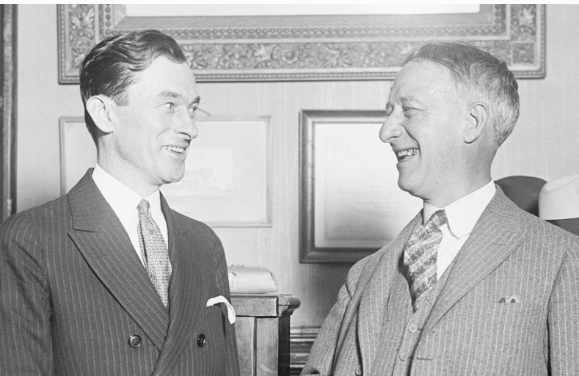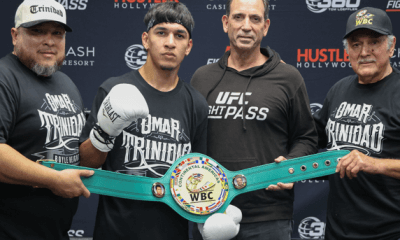Featured Articles
This Week in Boxing History: New York’s ‘Night Mayor’ Emancipates the Sweet Science

Sunday, May 24, marked the centennial of an important date in boxing history. On that date in 1920, the Governor of New York, Al Smith, signed into law a boxing bill sponsored by Sen. Jimmy Walker. The law changed the face of professional boxing, not only in New York, but around the country as the Walker Law became the template for boxing reform laws elsewhere.
James John “Jimmy” Walker, born in 1881 on the west side of Lower Manhattan, served 15 years in the New York State Legislature but would be best remembered as New York City’s colorful Jazz Age mayor. Before we give the man a closer look-see, let’s look at the law that he fathered and the conditions that existed before the law came into being.
From 1911 through 1917, professional boxing in New York was governed by the Frawley Law. It restricted bouts to licensed athletic clubs, in theory to protect the public from fly-by-night promoters, set the ceiling at 10 rounds, and stipulated that no decision could be rendered.
Gov. Charles Whitman, who assumed office in 1915, loathed prizefighting. For Whitman, the last straw came on Jan. 30, 2017. On that date, a young boxer making his pro debut suffered a fatal injury on a card in Albany. That very afternoon, not far from the boxing arena, state’s attorneys had grilled Fred Wenck, the chairman of the state athletic commission, regarding accusations that he had taken kickbacks from boxing promoters in return for certain favors.
Whitman persuaded the legislators to repeal the Frawley Law. For a three-year period beginning in the fall of 2017, New York had no boxing law whatsoever. The absence of any law was construed to mean that a licensed athletic club could continue to stage “scientific sparring exhibitions” for the edification of its members providing that no admission was charged. Big fights had a trickle-down economic effect and swelled the state treasury with tax money. Whitman, a Republican, was reproached for corking that spout. In the 1918 election he was unseated by Al Smith, a Tammany Democrat.
The main feature of the Walker Law was that everyone involved in a boxing match — from the lowliest spit-bucket carrier to the promoter — had to be licensed. The licensees were accountable to the boxing commission which had the power to approve matches, assign the officials, establish and collect fees, and revoke the license of wrong-doers. Matches were approved up to 15 rounds and decisions were allowed. Two ringside judges determined the winner and if they disagreed, the referee would act as the tie-breaker. A 5 percent tax was assessed on gate receipts.
Gov. Smith (pictured on the right; Walker on the left) was fond of Jimmy Walker with whom he had much in common, but he was reluctant to approve the Walker Law for fear of incurring the wrath of the Protestant clergy. An ambitious man, Al Smith aspired to be America’s first Roman Catholic president (he was the Democratic standard-bearer in 1928) and needed all the help he could get. Smith had already ruffled the feathers of many clergymen by signing into law a bill that allowed New York’s baseball teams to play on Sundays. That measure was also the handiwork of Jimmy Walker.
The Walker Law found an unlikely ally in J. Drexel Biddle, an eccentric millionaire and ex-Marine of Quaker Stock who had founded an international Bible society with a purported 200,000 members. An avid boxing fan, Biddle — as the story goes — reached out to the leading members of his society and asked them to send a telegram to Gov. Smith encouraging him to approve Jimmy Walker’s bill. Swamped with telegrams, the Governor acquiesced. In the eyes of the cynics, the senders operated out of fear that Biddle would cut off their supply of free Bibles.
Jimmy Walker
When Jimmy Walker ran for mayor of New York in 1925, he was pitted against Frank Waterman, the fountain pen magnate. It was no contest. In the final tally, Walker won by a margin of 402,123 votes.
When he ran for a second term, his opponent was Fiorello LaGuardia.
Handicappers noted that LaGuardia had a lot more going for him. Born in New York City to Italian immigrants – a lapsed Catholic father and a Jewish mother — LaGuardia, nominally an Episcopalian, was married to a woman who was descended from a long line of German Lutherans. He was a balanced ticket all by himself said the wags, seemingly the perfect choice to represent the melting pot that was New York. But Walker blew him out of the water, winning by a plurality of nearly 500,000, a record up to that time. If this had been a 15-round fight, Jimmy Walker would have won every round. (LaGuardia rebounded nicely; they would name an airport after him.)
Like all great Irish politicians, Jimmy Walker had a remarkable facility for remembering names. He also had the soul of troubadour. Before making his mark in politics, he was a Tin Pan Alley songwriter with one big hit to his name. He wrote the lyrics to “Will You Love Me in December as You Do in May?”, which would have topped the charts, had there been charts, in 1906.
Growing up on the west side of Lower Manhattan, an Irish stronghold in his day, it was perhaps inevitable that Walker would become a big boxing fan. He also loved the theater. As mayor, he attended the opening of every Broadway play. Reporters dubbed him the “Night Mayor.” His chief lieutenant, a man named Charles Kerrigan, became the “Day Mayor.” Another of Walker’s nicknames was “Beau James,” an allusion to the British dandy Beau Brummel. All of Walker’s clothes, which filled several closets, were custom-made.
Walker was in great demand as a toastmaster and after-dinner speaker. In 1942, with the war heating up in Europe, Walker presented the Edward J. Neil Memorial Trophy to Joe Louis at the annual dinner of the Boxing Writers Association. The award was given to the person who “has done the most for boxing in the preceding year.”
“Joe,” said Walker, looking directly at the boxer, “when you donated your purse from the Buddy Baer fight to Army and Navy Relief, you laid a rose on the grave of Abraham Lincoln.”
There were a lot of hard-boiled characters at that gathering and there wasn’t a dry eye in the house.
On July 5, 1932, in his capacity as mayor, Walker officiated at the wedding of his great friend Damon Runyon and Runyon’s trophy bride, the exotic Spanish dancer Patrice Del Grande. The nuptials were held at the home of New York American sports editor Bill Frayne. Runyon, like Walker an inveterate night owl, and Frayne would later hook up with Broadway ticket broker Mike Jacobs, a fledgling boxing promoter, in the formation of the 20th Century Sporting Club, a clear conflict of interest.
Jimmy Walker, who was tight with the speakeasy crowd, was guilty of a lot of conflicts of interest during his tenure as mayor, far too many to touch upon in this story. It did not redound well to him that Madison Square Garden matchmakers James J. Johnston and Dan McKetrick had an office at City Hall.
The dirty laundry came out in the hearings of the Seabury Commission, a body established by Gov. Franklin D. Roosevelt. Facing impeachment, Walker resigned and left town for an extended stay in Europe. He was accompanied by his mistress and future wife Betty Compton, a stunningly attractive actress and singer. They tied the knot in Cannes, France, on April 18, 1933. He was 52 years old and she was 29. It was his second marriage and her third.
She did not love him in December as she had in May. She divorced him after seven years of marriage.
When Walker returned from Europe, he was considerably lighter in the pocket. In a burst of compassion, Fiorello LaGuardia, his successor, created a sinecure for him, a job as an arbitrator of disputes between garment manufacturers and their unionized workers. It paid $20,000 a year, good money in those days but hardly enough to allow Walker to keep up appearances. During his mayoral years, he purchased an impressive 6,500-square-foot home in the tony Long Island suburb of Old Westbury, a place that he hardly ever occupied. After Betty Compton flew the coop, he moved in with his sister and her two sons in a home in a middle class neighborhood in Pleasantville, New York, 30 miles north of the city. As for going out on the town, he limited himself to the Friday Night Fights at Madison Square Garden and a late dinner afterward with a few old friends.
He and Betty Compton had adopted two children, little babies when they brought them into their world. As Walker grew older and started having health problems, it bothered him greatly that he would not be able to leave them an inheritance. He reached out to Gene Fowler, a friend of long standing, and arranged for Fowler to write his life story with an eye toward selling it to Hollywood; for a writer, that’s where the big money was. Fowler had previously written a biography of the famous actor John Barrymore.
The biography was titled “Beau James” and it did indeed spawn a movie. Bob Hope, in a rare straight role, portrayed Walker. But Walker died before the manuscript was finished.
It isn’t a stretch to compare the arc of Jimmy Walker’s life with that of a prizefighter. He built up his fan base as a state legislator, similar to a boxer working his way up the ladder to a title shot. His days as a title-holder, meaning his days as the mayor of one of the greatest cities in the world, were frothy days that would seemingly never end. But, of course, they did end and, in his dotage, like an old fighter, Walker rued that he hadn’t squirreled away more of his money when things were going good.
Walker died on Nov. 16, 1946 at age 65 of a brain aneurism after being in a coma for 36 hours. At his funeral service, a high requiem mass at Saint Patrick’s Cathedral, the sidewalk outside was jammed with people for whom there was no room in the church. Estimates ran as high as 5,000. A reporter noted the presence of several old Irish women with tears in their eyes clutching rosary beads.
The man they remembered was the dashing fellow that personified the spirit of Broadway in the Roaring 20’s, not the man that left office in disgrace and became another symbol of municipal corruption. And in that way too, the arc of Walker’s life was like that of a prizefighter. As we grow older, the good memories come flooding back and we forgive the sports heroes of our youth for letting us down as their careers unravelled.
There was always a lag before a new piece of legislation took effect. Signed into law on May 24, the Walker Boxing Law took effect on Sept. 1, 1920. James J. “Jimmy” Walker was posthumously inducted into the International Boxing Hall of Fame with the class of 1992.
Check out more boxing news on video at The Boxing Channel
To comment on this story in The Fight Forum CLICK HERE
-

 Featured Articles3 weeks ago
Featured Articles3 weeks agoThe Hauser Report: Zayas-Garcia, Pacquiao, Usyk, and the NYSAC
-

 Featured Articles2 weeks ago
Featured Articles2 weeks agoOscar Duarte and Regis Prograis Prevail on an Action-Packed Fight Card in Chicago
-

 Featured Articles1 week ago
Featured Articles1 week agoThe Hauser Report: Cinematic and Literary Notes
-

 Book Review4 days ago
Book Review4 days agoMark Kriegel’s New Book About Mike Tyson is a Must-Read
-

 Featured Articles4 weeks ago
Featured Articles4 weeks agoManny Pacquiao and Mario Barrios Fight to a Draw; Fundora stops Tim Tszyu
-

 Featured Articles4 weeks ago
Featured Articles4 weeks agoArne’s Almanac: Pacquiao-Barrios Redux
-

 Featured Articles3 weeks ago
Featured Articles3 weeks agoRemembering Dwight Muhammad Qawi (1953-2025) and his Triumphant Return to Prison
-

 Featured Articles4 weeks ago
Featured Articles4 weeks agoOleksandr Usyk Continues to Amaze; KOs Daniel Dubois in 5 One-Sided Rounds


















